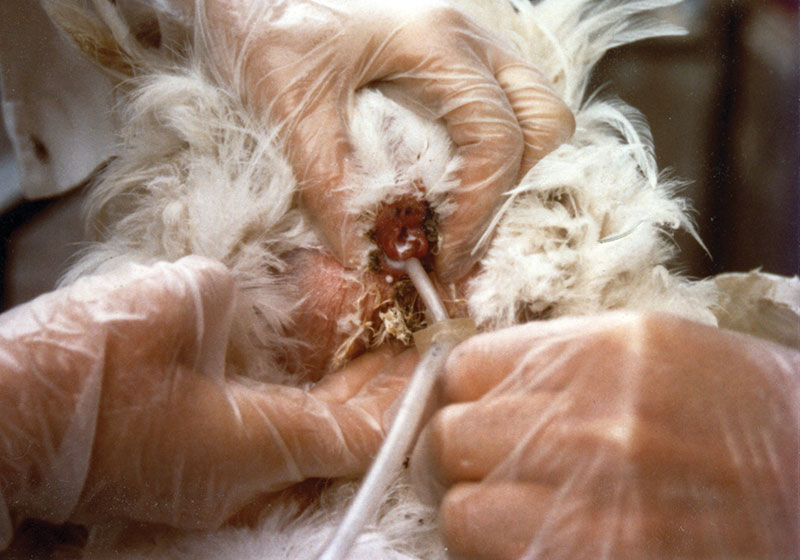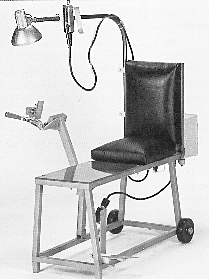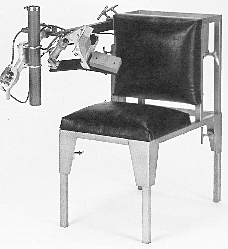Interspecies sexual assault is the foundation of animal farming. It is the primal act of violence to the animals from which every other assault upon them
follows. Carol J. Adams discusses the pornography of animal farming here:
Female Reproductive Exploitation Comes Home

Chicken Hen being artificially inseminated.
Turkey parents are “milked” and artificially inseminated by teams of “milkers” to produce “Thanksgiving” turkeys (all
farmed turkeys all the time ). In this
Interview published in the Poughkeepsie Journal in late October, UPC president Karen Davis offers a
thumbnail sketch of the life and death of “food production” turkeys, and more. Since pop-up ads keep interfering with the article and a video
about cooking chicken is inserted smack in the middle of it – here is the article unencumbered.
Turkey expert offers look at animal treatment
|
By Sande Nosonowitz, For Living & Being: An Interview with United Poultry Concerns President Karen Davis, Poughkeepsie Journal, Oct. 19, 2016
I have written several columns about celebrating Thanksgiving without a turkey as the centerpiece of the dinner table, easing the grip of tradition and
developing the willingness to try something different. What does it say about us — to be so entrenched in tradition that we can live in willful
oblivion as we completely disregard the suffering endured by millions upon millions of sentient animals?
I am not an authority on turkeys and chickens, but I do know someone who is. Karen Davis, PhD is the founder and president of United Poultry Concerns, a nonprofit organization that promotes the compassionate and respectful treatment of
domestic fowl, including a sanctuary for chickens in Virginia. She is a sought after speaker and the author of several books on this subject. Karen agreed
to answer a few interview questions and I am grateful for the opportunity to share her answers with you, as this Thanksgiving holiday once again
approaches.
How many turkeys are killed for Thanksgiving in America, and how do most live and die?
The turkey industry claims 46 million birds, but 37 million is closer to fact. Regardless, we kill over 235 million turkeys each year. For millions of
turkeys, every day is a horrible “Thanksgiving.”
Turkey parents are inseminated by teams of “milkers” to produce “Thanksgiving” turkeys. At birth, the baby turkeys are de-beaked
and de-toed without painkillers, to offset the destructive effects of overcrowding. They suffer in filthy buildings full of toxic ammonia. Bred, fed and
drugged to grow too fast and too heavy, turkeys have trouble carrying their weight, and many struggle to walk on their wings to reach food and water.
At the slaughterhouse, turkeys are torn from the transport crates, hung upside down and dragged face down through electrified water. The electricity does
not stun them. It paralyzes their muscles so their feathers will come out more easily after they are dead. The turkeys experience
“intolerable pain,” researchers explain.
|

One-Man Tom Milking Bench
Patent #3,872,869;
"All of these features found on our One-Man Tom Milking Bench lend themselves to the ability of one person to collect the highest
quality semen, free of fecal, urates or other spermicidal material."
From equipment catalog of International A.I. Inc.

A.I. Chair & Colossus
Patent #3,8880,122;
"With the hen immobilized by our A.I. Chair & Colossus, one person can hold, invert, and inject, obtaining higher fertility with
less cost."
From equipment catalog of International A.I. Inc.
|
Many people believe they’re consuming ‘healthy protein’ when consuming the flesh of turkey — is that true or false?
Turkey is not a low-fat, low-cholesterol food. Like all meat, turkey is permeated with artery-clogging saturated fat that can’t be cut away. And the
cholesterol content of chicken or turkey is comparable to that of red meat – about 25 milligrams per ounce.
Food poisoning kills 3,000 Americans each year and makes 48 million sick, and poultry products are the main source, according to the Centers for Disease
Control. Together, salmonellosis and campylobacteriosis are the leading bacterial diseases transmitted from poultry products to humans, causing a massive
number of infections and inflammation, and often recurring as reactive arthritis later in life.
Turkeys are fed antibiotics to promote growth rates artificially and to control the diseases that result from filth and stress. A Reuters report in 2014
revealed that “Major U.S. poultry farms are administering antibiotics to their flocks far more pervasively than regulators realize, posing a
potential risk to human health.” Antibiotics prescribed to sick people — many of whom suffer from bacterial infections from eating and handling
turkey, chicken and egg products — are increasingly ineffective, as bacteria become ever more resistant. And while antibiotics are designed to treat
bacterial infections, too many antibiotics can weaken the human immune system as well as that of the birds, increasing susceptibility to illnesses in both
groups.
You have been caring for and observing turkeys for years now. Can you tell us about their distinct and endearing personalities?
Turkeys have a zest for living. In nature, turkeys walk, run, fly and swim. They play games together. Young turkeys spend five months close to their doting
mothers. Turkeys rescued from abuse are very friendly with people. They love to be petted and display themselves, eager for attention and participation in
what’s happening. Once, at a sanctuary, a man I was showing around expressed surprise when a turkey named Milton joined our walk through the yard,
plodding beside us and stopping whenever we paused. The man, at first ignoring him, finally exclaimed, “I didn’t know turkeys could –
could” – could what? I think what he was trying to say was “be companionable.” I know from my own experience how personable turkeys
are. And let no one tell you that turkeys bred for “food” are stupid. They’re as sensitive, alert and aware as you and I.
Karen Davis, PhD is the author of “Prisoned Chickens, Poisoned Eggs: An Inside Look at the Modern Poultry Industry”; “More Than a
Meal: The Turkey in History, Myth, Ritual, and Reality”; “The Holocaust and the Henmaid’s Tale: a Case for Comparing
Atrocities”; “A Home for Henny”; and “Instead of Chicken, Instead of Turkey: A Poultryless ‘Poultry’
Potpourri.”
“The thinking person must oppose all cruel customs, no matter how deeply rooted in tradition. When we have a choice, we must avoid bringing
torment and injury into the life of another.”
— Albert Schweitzer
Sande Nosonowitz is a Certified Vegan Lifestyle Coach and Educator as well as a certified yoga and meditation teacher.
Contact her at www.sundarajewel.com;
email sande@sundarajewel.com
Sande is a principal organizer of the
Hudson Valley Vegfest coming to Poughkeepsie in 2017 ...
Karen Davis will be speaking and United Poultry Concerns will host an exhibit booth at the
Hudson Valley Vegfest.